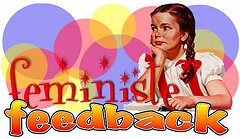A reader sent me an email asking for my thoughts, and (with permission) I turn it over to the Feministe commentariat:
 Jill,
Jill,
Do you think polygamy is compatible with feminism? I’m discussing this
with some people right now. Their argument is well, people should be
allowed to do what they want. I usually agree with this but I feel
that polygamy is inherently patriarchal because there is only one man
involved in the union meaning the man is the most valuable member,
thus the most important. What do you think?
Thoughts?